Overview
Transport represents a fundamental sector of our economy and society, it secures personal mobility and supports economic growth. In final energy consumption the EU transport sector holds a share of 33 % in 2011, which corresponds to 364 Mtoe (see figure 1). In comparison: the worldwide share of transport in the final energy consumption was 18 % (2,221 Mtoe) in 2009 (IEA-AMF 2012). This emphasizes that transport is an essential energy topic for the European Member States, in goods and people transport, both individual and mass.
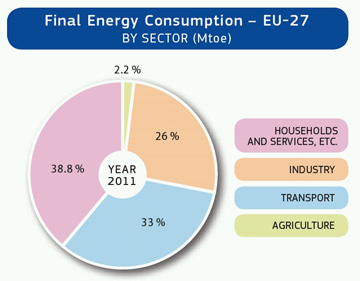
Figure 1: Final Energy Consumption – EU-27 by sector (Mtoe) (EC 2013, EU transport in figures)
Total energy consumption of transport in Europe
In Europe total energy consumption of transport accounts for 364 Mtoe in 2011, with the different transport modes - road (81.7 %), air (13.9 %), rail (2.0 %) and water (1.6 %) (EC 2013). For the years 1990 and 2010 the energy consumption of transport by mode in the EU is given in figure 2 (Odyssee-Mure 2013).
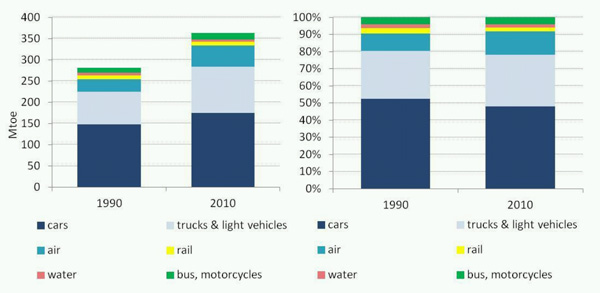
Figure 2: Energy consumption of transport by mode in the EU
Global energy consumption in the transport sector
Global energy consumption in the transport sector accounted for approximately 2,300 Mtoe in 2009, with 77 % of it consumed by road transport, 10 % each by global aviation and by marine transport and 3 % by rail transportation (see figure 3).
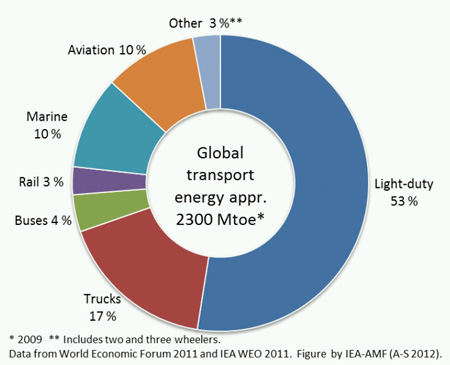
Figure 3: Global view on transport modes 2009 (AMF 2011)
Oil dependency, fuel security and reduction of GHG emsissions in Europe
The EU is strongly dependent on imported crude oil for its energy supply. In 2010, 94 % of the energy consumed for its transport and mobility came from oil products. This contributes to an oil import bill of around €1 billion a day in 2011 (COM (2013) 17). Oil dependency has to be addressed to secure people’s ability to travel and to strengthen EU’s economy.
A second issue, besides the reduction of oil dependency, is the reduction of world greenhouse gas emissions, with the goal of limiting climate change below 2°C by the end of this century. In the white paper “Roadmap to a single European Transport Area” the European Commission has defined a target for transport of 60 % reduction in 2050 compared to 1990 (COM (2011) 144).
To meet this target the EC defined 10 goals for a competitive and resource efficient transport system subdivided into three main sections:
- Developing and deploying new and sustainable fuels and propulsion systems
- Optimising the performance of multimodal logistic chains, including by making greater use of more energy-efficient modes
- Increasing the efficiency of transport and of infrastructure use with information systems and market-based incentives
The role of biofuels in achieving a competitive and resource efficient transport system
To achieve these goals both, biofuels and electro-mobility will play significant roles, as they together could technically substitute oil in all transport modes. Another important factor is the increase of efficiency of transport modes, regarding all three segments: urban transport, medium and long distance transport.
Liquid biofuels are currently the most important type of alternative fuels, because of their high energy density and the applicability in all transport modes, using existing infrastructure and vehicles. The coverage of transport modes and travel range by the main alternative fuels is depicted in figure 4 (COM (2013) 17). There will be no single fuel solution for the future mobility – a consistent long-term strategy on alternative fuels has to meet the energy needs of the different transport modes.
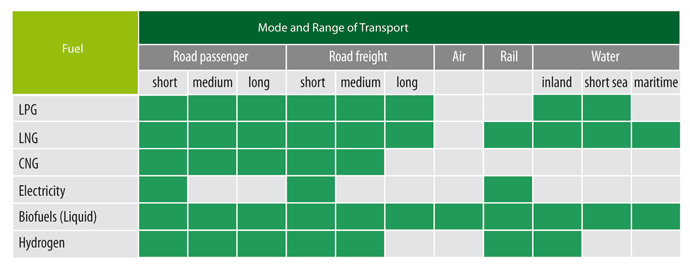
Figure 4: Coverage of transport modes and travel range by the main alternative fuels (COM (2013) 17)
In the ERTRAC Roadmap “Energy Carriers for Powertrains” this table has been extended to the compatibility of different transport modes and energy carriers from a technical prospective for today and in the future. It also gives an overview of research needs for mid and long term for the different combinations of transport modes and energy carriers (see figure 5).
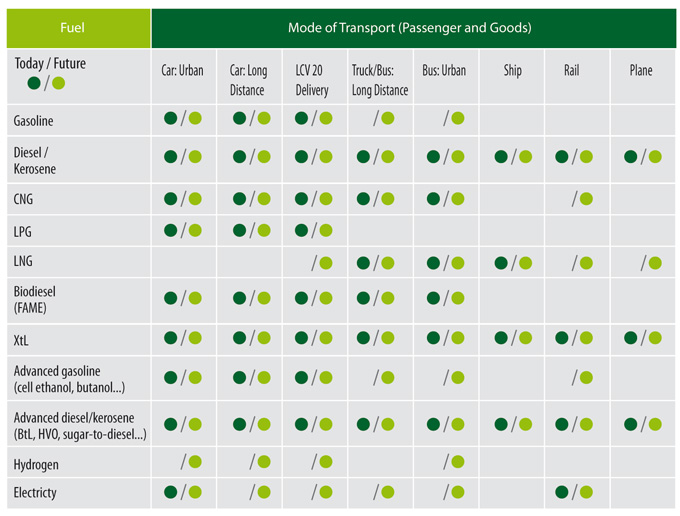
Figure 5: Transport modes and technical possible energy carriers for today and in future (ERTRAC 2014)
The rising demand of energy for transport in EU member states and worldwide and the reduction of oil dependency can only be met by the comprehensive mix of alternative transport fuels, electro-mobility and increase of energy efficiency. Advanced biofuels have the advantage of a high potential for all transport modes and are the only option for aviation – therefore the development and the progress of advanced biofuels technologies is crucial for rapid market development, which could break the dependence on oil and secure Europe’s energy supply, support economic growth and reduce GHG emissions from transport.
References
- AMF 2011: IEA Advanced Motor Fuels – Annual Report 2011
- COM (2011) 144: White paper – Roadmap to a Single European Transport Area – Towards a competitive and resource efficient transport system
- COM (2013) 17: Clean Power for Transport: A European alternative fuels strategy
- EC 2013: EU transport in figures – statistical pocketbook 2013
- ERTRAC 2014 – Energy Carriers for Powertrains – for a clean and efficient mobility
- IEA-AMF 2012: IEA Advanced Motor Fuels – Annual Report 2012
- Odyssee-Mure 2013 - Energy Efficiency Trends in the EU – Lessons from the Odyssee-Mure Project
